Contents
HeadsUp
I hope the teaching break has been good to you all!
I’ve been thinking about gratitude of late.
I am grateful to be in a School where people do things above and beyond what their job descriptions require of them. Last Thursday’s Sustainability Workshop was an example of this…Natalia Abrego, our Environmental Chemistry Technician curated an excellent morning in which various speakers and panel members reflected on how we as a School can be more sustainable and how we can join the dots between the personal and professional. The My Green Lab initiative that Blair Sowman introduced us to offers the prospect of ENV having a credentialled suite of laboratories where users walk the talk of sustainable practice. And the underlying philosophy can radiate outwards into how field trips are scheduled as well as conducted. Expect to hear more of this whole-of-school initiative. Maybe as we walk the talk of commitment to a more sustainable future we will become a degree more appealing to prospective students. Not that that is a reason to change but everyone likes to see alignment between practice and values.
I am also grateful for the way the Ako team have been implementing an action plan for the new Stage 1 course developments. As I’ve said before, this is no time to just do what we’ve always done. We need to evolve and this initiative is a critical example of many in the School being willing to step up to embrace change.
I write on the cusp of going overseas to my first international conference in six years. I feel grateful for this opportunity in a number of ways. First, I have heard from geography colleagues at two other New Zealand universities that their overseas travel is frozen due to their respective universities’ budgetary crises. Second, we have a high-functioning School where wheels keep turning and I can leave in the knowledge that Acting Heads can keep a hand on the rudder, so to speak. Thanks, in advance, George and Melanie. Third, amid the intensity of all that’s going on I am grateful at the prospect of getting away for a week and seeing colleagues from other places and chapters of my career.
I’ve also been feeling grateful for past influences on my career as a geographer. For the five years I was a student in the former Department of Geography in the late 70s/early ‘80s, a warm, cheerful and insightful presence was population specialist Warwick Neville. Hearing of his passing this week led me to reflect on the way he mastered the performance of lecturing in a low key but memorable way. As a former classmate and now a high school principal, Kevin Carter, reminded me, Warwick once humoured the class by wearing white when discussing fertility and then black when it came to mortality. And my indelible Stage 2 memory was when an unfortunate student dashed into a lecture late and tripped on the steps of the lecture theatre. Warwick simply glanced up and said ‘thanks for dropping in’. There’s a reason we teach in lecture theatres as the best lecturing involves an element of performance. Warwick was a master. What will students be grateful for in our teaching when they look back? Hopefully a rich mix of inspiration, understanding, clarity and hope for a better world.
Finally, I’m grateful when colleagues step outside their narrow specialism and live up to the imperative embedded in the Education Act of being a critic and conscience. This past week, Tom Baker had a splendid commentary in The Conversation: https://theconversation.com/grant-robertson-is-swapping-cabinet-for-academia-but-should-ex-politicians-lead-universities-227549
May more of us have the temerity to speak our minds and be public academics. A great form of Outreach.
Robin Kearns
ENV-stories
By the time I was 21 years old I had lived in 21 houses. Some in the tropical climes of Singapore, some in the snow-halfway-up-your-front-door environs of Ontario, Canada, the grubby concrete jungle of New York, the quaint ‘almost London’ of Bromley, Kent, and some in the peripheral nature of Glen Waverley in Melbourne.
I felt right at home with the idea of global citizenship, growing up in Southeast Asia, not really comprehending our family’s untetheredness – my dad’s distance from his birthplace of Lancashire in England and my mum’s from Palmyra Village in Guyana. It was mum’s growing up stories that I was interested in most as they seemed so strange and sad to me. In 1956 her mother left her as a 3-year-old to grow up with her grandparents, at a time when England called on its colonies to send labour. She joined her mum in Tottenham when she was 16, going straight to work in the mailroom of a bank.
I’m sure that visiting my grandma in her tenement flat in Seven Sisters – surrounded by fried chicken takeaway shops, Caribbean flags and rasta music, and the smell of curry spices – gave me some appreciation of my own connections and history. It gave me context for why my family listens to Harry Belafonte at Christmas, and perhaps why I (and mum, it seemed) feel most at home in multicultural, multilingual, multiracial, and multicoloured settings. It gave me insight into the florid life of Guyana without having been there – mum won’t go back there as she remembers it as dangerous. I also recently learned it’s currently at the mercy of corporate oil interests.
There are things and places in my family before Guyana that I am continuing to find: Which ship it was that was bearing indentured sugarcane labourers from which part of India, and when exactly? Who did they leave behind? I’m still tracing these lines.
Emma Sharp
Whakawhanaungatanga – Communities
Plastics are everywhere—on land, in the sea, in the air and in our bodies. What are the effects of this ubiquitous substance on our own health and the health of the animals and ecosystems?
Join Ngā Ara Whetū, the Centre for Climate, Biodiversity and Society, and Te Aka Mātauranga Matepukupuku, the Centre for Cancer Research, in the Members’ Lounge, Old Government House for a thought-provoking panel conversation this Earth Day.
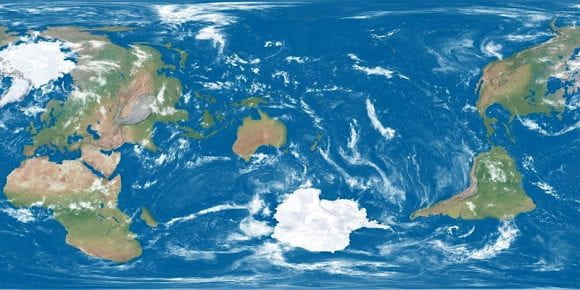 Mon, 22 Apr 2024 4:00 PM – 6:00 PM
Mon, 22 Apr 2024 4:00 PM – 6:00 PM
Our researcher panellists, who join us from a wide range of disciplines, are:
Dr Samantha Ladewig (Marine Science)
Assoc. Professor Anne Gaskett (Biological Sciences)
Assoc. Professor George Laking (Medical Oncology, Manutaki Haumanu Māori of Te Aka)
Dr Manuel Vallee (Sociology)
Dr Joel Rindelaub (Chemical Sciences)
Moderated by Dr Maria Armoudian (Co-Executive Director of Ngā Ara Whetū)
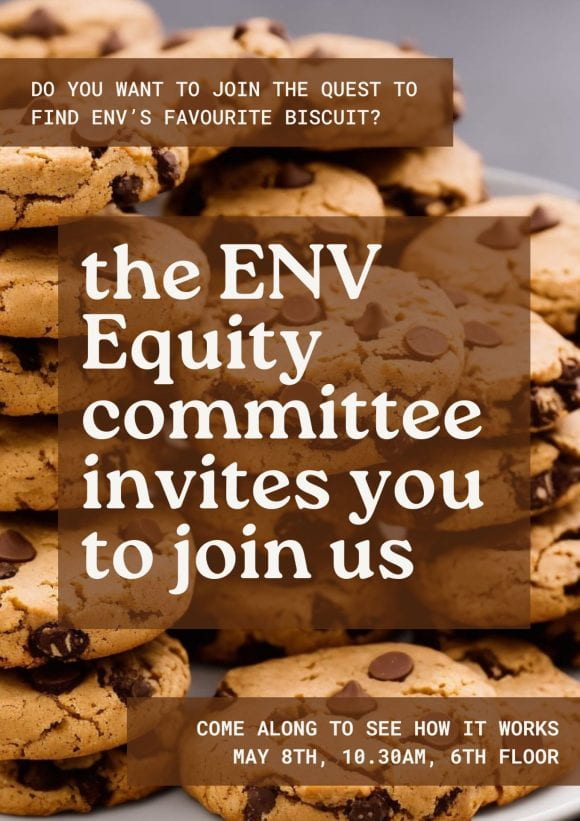
The GEOG 745 (Applied Fluvial Geomorphology) class travelled to the Te Hoiere catchment, April 1-4, to work with Marlborough Council on ‘nature-based’ techniques for mitigating flood impacts.
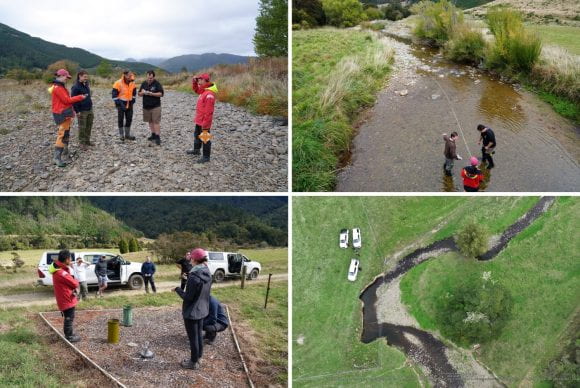 In collaboration with Jon Tunnicliffe, the council has set up monitoring stations in 20 sub-catchments, to refine rainfall-runoff models under a variety of land-cover conditions (e.g. rangeland, forest [native, plantation], recently de-forested, mixed cover). Students had the opportunity to visit a number of these river gauging sites and to collect data for their individual projects. The projects address the feasibility of various runoff attenuation measures, intended to delay and divert flood flows while improving habitat diversity and enhancing ecosystem services. The council’s new LiDAR drone was deployed to collect high resolution data and imagery for the project, while students collected information on channel substrate and vegetation. Discussions with landowners and land managers provided many first-hand insights into the many challenges of flood management in the area. Results of the student work will feed back to the project, broadening the scope of the work while providing students with some practical, applied experience and a new array of geomorphology/hydrology skills.
In collaboration with Jon Tunnicliffe, the council has set up monitoring stations in 20 sub-catchments, to refine rainfall-runoff models under a variety of land-cover conditions (e.g. rangeland, forest [native, plantation], recently de-forested, mixed cover). Students had the opportunity to visit a number of these river gauging sites and to collect data for their individual projects. The projects address the feasibility of various runoff attenuation measures, intended to delay and divert flood flows while improving habitat diversity and enhancing ecosystem services. The council’s new LiDAR drone was deployed to collect high resolution data and imagery for the project, while students collected information on channel substrate and vegetation. Discussions with landowners and land managers provided many first-hand insights into the many challenges of flood management in the area. Results of the student work will feed back to the project, broadening the scope of the work while providing students with some practical, applied experience and a new array of geomorphology/hydrology skills.
You can find out more about the ongoing Te Hoiere project here: https://storymaps.arcgis.com/collections/659e7955606146b38e58764e700b92f7
QGIS for Research Science
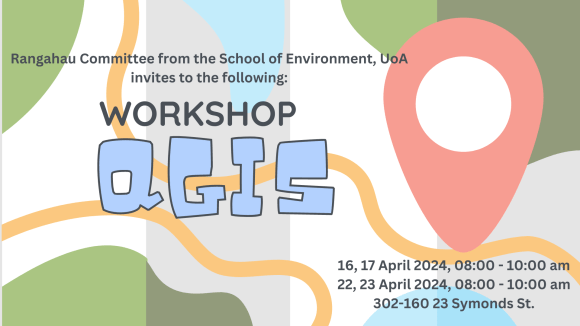
The Rangahau/Research Committee has organized a QGIS workshop.
Maike Gatzlaff and Jaxon Ingold will be delivering the course, which will run for 4 days, divided into two consecutive weeks:
1st week: Tuesday: 16 April and Wednesday: 17 April
2nd week: Monday: 22 April and Tuesday: 23 April
There are 4 sessions of two hours each (08:00 to 10:00 am).
It is open to postdoc, and also postgradute students (PhD). If you are interested, email me at joa.paredes.marino@auckland.ac.nz. Spots will be assigned on a first-come, first-served basis. Do not hesitate to contact me if you have any further questions.
28th AINSE Winter School: Expressions of Interest open (expressions of interest received until 15 May 2024) (flyer attached and available online)
The annual AINSE Winter School offers a once-in-a-lifetime opportunity for senior undergraduate students to discover the potential for further research in nuclear science and related technologies. In the online week of the 2024 event, students can meet and engage with future research collaborators, gain deep insight into ANSTO’s landmark research facilities, and network with other like-minded students from all across Australia and New Zealand.
Online participants can apply for a further opportunity to explore two world-class ANSTO research facilities in person in September, after the online event concludes.
Expressions of Interest for the 28th AINSE Winter School, held online from 1-10 July 2024, are open to all senior undergraduate students interested in learning about the techniques of nuclear analysis. Such techniques have applications across a wide range of disciplines, including archaeology, biology, chemistry, engineering, geology, materials science, medicine, nanotechnology, and physics.
The AINSE Winter School provides an ideal opportunity for students in their final year of undergraduate STEM studies to meet potential collaborators and explore potential options for future research projects using ANSTO facilities in collaboration with ANSTO researchers. Throughout the week, students attend a mix of online lectures, social activities, and experiments relating to:
- Neutron Scattering (using neutron beamlines on the OPAL Multipurpose Reactor);
- X-Ray and IR Scattering (using beamlines on the Australian Synchrotron)
- Ion Beam Analysis (using ANSTO’s suite of linear accelerators);
- Environmental studies using natural radioactivity (including sedimentation rates and erosion, geomorphology, and climate change); and
- Nuclear techniques in materials science.
A virtual tour of other major ANSTO facilities is also included in the program, alongside an online Research Roundup networking event for students to discuss future research opportunities working alongside ANSTO researchers.
For more information, please visit the Winter School website or contact AINSE at forum@ainse.edu.au.
Scholarship AINSE ANSTO French Embassies (SAAFE): applications open (applications close 1 July 2024) (flyer attached and available online)
AINSE, in partnership with ANSTO, the Embassy of France in Australia and the Embassy of France in New Zealand, are delighted to announce that applications for the Scholarship AINSE ANSTO French Embassies (SAAFE) Program are currently open, for international travel in the period 1st October 2024 – 31st December 2025.
Applications close 11.59 pm 1st July 2024 (Australian Eastern Standard Time).
The Scholarship AINSE ANSTO French Embassies (SAAFE) Program is an exciting international exchange opportunity open to Early Career Researchers at the Ph.D. and postdoctoral level. Each successful applicant is provided with costs towards a return flight and up to A$200 per week (up to a maximum of 26 weeks) to support accommodation expenses associated with a visit from:
- Australia/New Zealand to France, or
- France to Australia.
The SAAFE Program supports Early Career Researchers to expand research in nuclear science and engineering in the areas of Health, Environment and Nuclear Technologies, and to initiate sustainable research networks and linkages in order to support Australia, New Zealand and France in research and innovation.
Eligible applicants must be a PhD student in, or hold a postdoctoral appointment at, a French university or AINSE-member university. The research project must be in collaboration with at least one researcher employed by ANSTO or another Australian AINSE-member institution (in the field of nuclear science and engineering and in the areas of Health, Environment or Nuclear Technologies), and at least one researcher employed by a French university or French research institution.
The research internship is required to take place over a period of 8–26 weeks between 1st October 2024 – 31st December 2025.
For more information, including the application form and terms & conditions, please visit our SAAFE website or contact AINSE on +61 2 9717 3376 / applications@ainse.edu.au.
The Scientia Trust Planet Earth Fund
The Scientia Trust Planet Earth Fund, proudly managed by Perpetual Guardian will be opening for funding applications from Wednesday 3rd January 2024 to Friday 29th April 2024.
This funding opportunity takes place once every 5 to 15 years.
We welcome applications from organisations and individuals for the purpose of:
- The study of earthquakes
- The study of bulk properties of the Earth
- The study of astronomical motions
- The study of the internal structure of the Earth
- The history of such studies.
Please feel welcome to share this opportunity with colleagues working in one or more of the above areas.
This funding round will be held on the Perpetual Guardian Funding Hub. You can find out more about this on our website here: https://www.perpetualguardian.co.nz/philanthropy/grant-seekers/grants-open-upcoming/
If you wish to be considered for funding you will need to register as a Perpetual Guardian Funding Hub user before you are able to submit an application.
You can register here: https://perpetualguardian.fluxx.io/user_sessions/new (look for the ‘Create an Account’ link).
Marian Cranwell Prize ($3,000)
The Prize will be awarded annually to the student who, in the opinion of the selection panel, completed the best thesis or dissertation focussing on the areas of environmental or ecological science, including the cultural history of environmental areas, in fulfilment of the requirements for a Masters or PhD degree. This is open to Students in School of Environment as well. If you have in mind any worthy nominees could you let me know as soon as convenient please and provide a note in support of your nomination.
Kind regards,
Barkha Bheda
Group Services Administrator
School of Biological Sciences: gsa.biologicalsciences@auckland.ac.nz
Exercise Sciences: gsa-exercise@auckland.ac.nz
FUNDS FOR ENGAGEMENT WITH HAPORI MAORI
School of Environment has a small budget for enabling engagement with Maori, particularly through koha or contributions that may be needed to initiate research relationships. In disbursing that putea, priority is given to academic staff working on behalf of groups of staff or students, pre/consultation activities for ethics approval and collaborations that are not readily funded through other mechanisms. As it is desirable to utilise the budget before the end of the academic year, however, all well-reasoned proposals will be considered. If interested, email a brief, one paragraph description of a proposed activity and a budget for how funds will be utilised to Brad (b.coombes@auckland.ac.nz). Although there are no prescribed maxima or minima for these grants, the limited scope of the overall budget will likely preclude grants in excess of $1000. Applicants should also be mindful of UoA guidelines or policies for gifting and koha.
Post Graduate Wellbeing ….. where to go
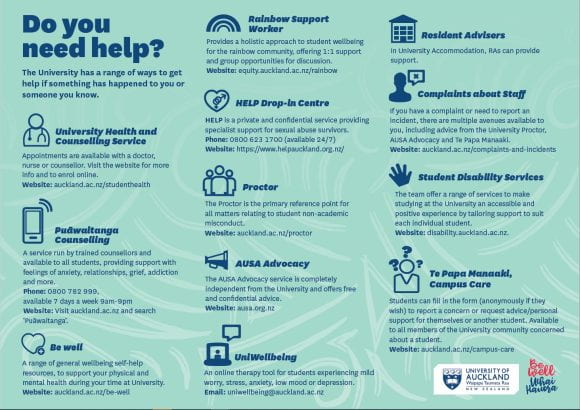
If you are currently coordinating a PG course, could you please post the inforgraphic slide to your Canvas course page so students will know the resources that are available throughout the University.
3k writing grant available for students
These are currently on hold. Rangahau will reopen this fund for requests later in the year, please keep an eye on P-cubed for more details.
Rangahau – Research
Student Research Experience
Are you a post-grad student researcher at the School of Environment (Hons/MS/PhD)? Would you like to get some support for your research from an undergrad student sometime this year? We are talking about 30 hours as a guide, either used as a block or distributed in the year. We have flexibility. In addition to gaining support for your research, this is a great opportunity for you to gain experience in mentoring an undergrad student and share your passion for the research you conduct.
If you are interested, please complete this form by 23rd April: https://forms.gle/pCEsyQJZAywxirKB7
Please email Katarzyna Sila-Nowicka (Sila) Katarzyna.sila-nowicka@auckland.ac.nz if you have questions.
Funding for Research Retreats
The Rangahau Committee has a small amount of funding set aside to sponsor Research retreats (e.g grant writing workshops, paper writing). This can be up to 2k per team, with a minimum 2 SoE participants.
If you have an idea that you would like considered, please submit a short paragraph explaining the intention and benefits of the retreat to katarzyna.sila-nowicka@auckland.ac.nz.
Proposal development support
The Rangahau Committee has a small fund set aside to help with proposal development (e.g. writing support, support to scope proposals etc). If you have an idea that fits within this scope please get in touch with Kelly Kilpin to discuss further.
Funding
Funding Calls
Aotearoa New Zealand Tāwhia te Mana Research Fellowships
The Royal Society Te Apārangi have announced they will be administering the new Aotearoa New Zealand Tāwhia te Mana Research Fellowships, with the funding round opening soon. These fellowships consists of three schemes, targeted at early, mid- and established career researchers respectively:
- New Zealand Mana Tūāpapa Future Leader Fellowship
- New Zealand Mana Tūānuku Research Leader Fellowships
- New Zealand Mana Tūārangi Distinguished Researcher Fellowship
Further information can be found on the RSNZ website. Once the call opens, details will be circulated via P-cubed.
New Zealand-German academic exchange programme (ENZ-DAAD)
ENZ-DAAD’s Programmes for Project-Related Personal Exchange (PPP) is open again and inviting applications from students across all subject areas who are completing their doctorate, and from academics who have completed their doctorate in the last five years.
The application for 2024 close on the 28th of June.
| Spencer Foundation – Research Grants on Education: Small | |
| This fund aims to support education research projects that will contribute to the improvement of education. The research concept is “field-initiated” with the grant designed to support rigorous, intellectually ambitious and technically sound research that is relevant to the most pressing questions and opportunities in education. | |
| Value/Duration: | Deadline: |
| · Value: up to USD50,000 (circa NZD80,000).
· Duration: up to a maximum duration of 60 months |
· Internal Deadline for Full Stage: Internal Deadline: 5pm, Monday, 22 April 2024. |
| Further Information (funding call, guidelines, website):
If you are interested, please notify your FIRST (Kelly, Alex, or Sophie) of your intent to apply for this scheme to receive important information and updates in relation to this fund. |
|
Aotearoa New Zealand Tāwhia te Mana Research Fellowships
The first details of the new Aotearoa New Zealand Tāwhia te Mana Research Fellowships, developed as part of the Te Ara Paerangi – Future Pathways reform have been released. These new schemes replace the Rutherford Discovery, Rutherford Foundation and James Cook Fellowships, which will no longer be offered from 2024.
These fellowships will support early, mid, and senior researchers. For further details, please see MBIE’s web page which details eligibility, duration and value.
Funding calls will be publicised via P-cubed once they become available so please keep an eye on this space.
Announcements
| Horizon Europe Training Webinars | ||||
| These new sessions will continue to focus on critical areas of the bid development process and key steps for identifying a funding call/collaborative opportunity in the Horizon Europe Programme.
· Improving Researcher Visibility Amongst International Partners:
· Best Practice in Collaborative Proposal Writing: This webinar will give an insight into the standard ways of planning the work in a Horizon Europe project.
|
Health, Safety and Wellbeing
Staff and students have access to free flu and covid vaccine at campus pharmacy.
More information about vaccines: Vaccines available in Aotearoa New Zealand | Immunise | Te Whatu Ora
Personal and Professional development UoA
Academic life is underpinned by other set of skills that need or it is good to have, amongst this OD offers
- First Aid, advanced and refresher
There are alternatives, for First Aid Certificate. to these by external sources that might fit your busy calendar, please seek advice on these options. Before booking double check that it covers these units
Level 1 – Basic
NZQA 6402 – Provide resuscitation level 2 – 1 Credit
NZQA 6401 – Provide first aid – 1 Credit
Level 2 – Advanced
NZQA 6400 – Manage First Aid in an Emergency Situation (Field Activity Leaders)
First Aid Refresher:
Must have valid first Aid certificate
Other Providers
- Red Cross
- Saint Johns
- Besafe
- Meditrain
- First Training (offers outdoors first aid course)
- A1 first Aid
At OD you can also get training in the following:
- Mental Health 101
- Fire safety at work
- Risk assessment
- Health and Safety for Line Managers and Academic Leaders
- Health and Safety Representative Training Sessions
If you want Saint John’s offers Online Mental Health Training
Remember near misses should also be reported in Damstra, not only injuries.
Publications | Articles
- The threat of a major tree pathogen to forest soil mesofauna food webs and ecosystem functioning https://www.frontiersin.org/articles/10.3389/fevo.2024.1338109/full
- Hope, J.A., Coco, G. and Thrush, S.F., 2020. Effects of polyester microfibers on microphytobenthos and sediment-dwelling infauna. Environmental Science & Technology, 54(13), pp.7970-7982.
- Kearns, R. Moon, G and Andrews, G. (2024) A Sense of Community within a Site of Amplified Stigma: The Strange Case of Spookers. In Sites of Conscience: Place, Memory, and the Project of Deinstitutionalisation. Eds Punzi, E and Steele, L. UBC Press, Vancouver, pp.266-282.
